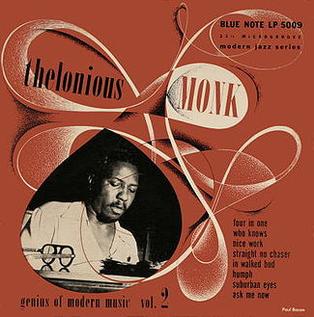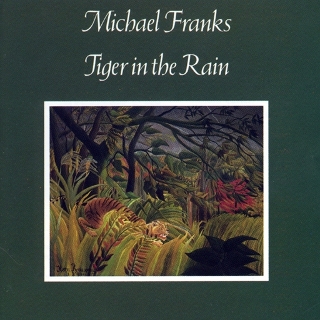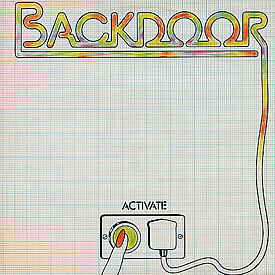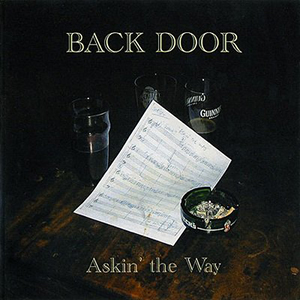
Henry Mobley was an American tenor saxophonist and composer. Mobley was described by Leonard Feather as the "middleweight champion of the tenor saxophone", a metaphor used to describe his tone, that was neither as aggressive as John Coltrane nor as mellow as Lester Young, and his style that was laid-back, subtle and melodic, especially in contrast with players such as Coltrane and Sonny Rollins. The critic Stacia Proefrock claimed him "one of the most underrated musicians of the bop era." Mobley's compositions include "Double Exposure", "Soul Station", and "Dig Dis".

Gary Bartz is an American jazz saxophonist. He has won two Grammy Awards.

John Arnold Griffin III was an American jazz tenor saxophonist. Nicknamed "the Little Giant" for his short stature and forceful playing, Griffin's career began in the mid-1940s and continued until the month of his death. A pioneering figure in hard bop, Griffin recorded prolifically as a bandleader in addition to stints with pianist Thelonious Monk, drummer Art Blakey, in partnership with fellow tenor Eddie "Lockjaw" Davis and as a member of the Kenny Clarke/Francy Boland Big Band after he moved to Europe in the 1960s. In 1995, Griffin was awarded an Honorary Doctorate of Music from Berklee College of Music.

Art Blakey and the Jazz Messengers, also called Moanin', is a studio album by Art Blakey and the Jazz Messengers recorded on October 30, 1958 and released on Blue Note later that year.
Back Door were a British jazz-rock trio, formed in 1971.

A Night at Birdland, Vols. 1 & 2 are a pair of separate but related live albums by the Art Blakey Quintet. They were recorded at the Birdland jazz club on February 21, 1954 and released on Blue Note in 1956. The performance was originally spread out over three 10" LPs as A Night at Birdland Vols. 1–3 (1954).

Colin Hodgkinson is a British rock, jazz and blues bassist, who has been active since the 1960s.

Genius of Modern Music, Vols. One & Two are a pair of separate but related 12" compilation albums by American jazz pianist Thelonious Monk released on Blue Note in 1956.

Genius of Modern Music, Vol. 2 is a 10" album by American jazz pianist Thelonious Monk released on Blue Note in 1952.

The Complete Blue Note Recordings of Thelonious Monk is a box set by American jazz pianist Thelonious Monk compiling his recordings for Blue Note first released as a limited four-LP box set on Mosaic Records in 1983 before being issued as a four-CD box set by Blue Note for the first time in 1994 as The Complete Blue Note Recordings.

Hank Mobley Quartet is the debut ten-inch LP by American jazz saxophonist Hank Mobley, recorded on March 27, 1955 and released on Blue Note later that year. The quartet features rhythm section Horace Silver, Doug Watkins and Art Blakey.

Tiger in the Rain is an album by singer-songwriter Michael Franks, released in 1979 on Warner Bros.

Afro-Cuban is an album by American jazz trumpeter Kenny Dorham, recorded for Blue Note on March 29, 1955 and released later that year on the Blue Note Modern Jazz Series, shortly before the label discontinued the format. It was soon reissued on the new 1500 series, recompiled with a session by an early incarnation of the ensemble, with new cover art.

At the Jazz Corner of the World, Vols. 1 & 2 are a pair of separate but related live albums by Art Blakey and the Jazz Messengers, recorded at the Birdland jazz club in New York City on April 15, 1959 and released on Blue Note later that year in September and October respectively. The quintet features horn section Lee Morgan and Hank Mobley and rhythm section Bobby Timmons, Jymie Merritt and Art Blakey.

The Jazz Messengers were a jazz combo that existed for over thirty-five years beginning in the early 1950s as a collective, and ending when long-time leader and founding drummer Art Blakey died in 1990. Blakey led or co-led the group from the outset. "Art Blakey" and "Jazz Messengers" became synonymous over the years, though Blakey did lead non-Messenger recording sessions and played as a sideman for other groups throughout his career.
"Yes sir, I'm gonna to stay with the youngsters. When these get too old, I'm gonna get some younger ones. Keeps the mind active."

Another Fine Mess is the third studio album by Back Door, released in 1975 by Warner Bros. Records. "Blakey Jones" is a tribute to Brian Jones, landlord of the Lion Inn on Blakey Ridge, an early supporter of the band who helped finance the recording of their first album. A display case of Back Door memorabilia still exists in the Lion Inn.

Activate is the fourth studio album by Back Door, released in 1976 by Warner Bros. Records. It was produced by Carl Palmer, known for his drumming in the bands Atomic Rooster and ELP. Original member Tony Hicks had left the band before recording the album and had been replaced by Adrian Tilbrook on drums. After the release of Activate, the band played less and less together, and eventually broke up around 1977.

The Human Bed is a live album by Back Door, released on 3 June 2002 by Hux Records and compiled from three sessions for BBC Radio 1. It takes its name from the composition "The Human Bed", first released on 1972's Back Door. The album, made between 1 March 1973 and 12 May 1974 at the BBC, includes four previously unreleased tracks.

Askin' the Way is the fifth studio album by Back Door, released in 2003 by Cultural Foundation. Featuring the original line-up of Ron Aspery, Tony Hicks and Colin Hodgkinson, the album comprises re-recordings of previously released songs and newly recorded compositions. It is the Back Door's first new material since 1976's Activate. John Fordham of The Guardian called the album "a guffawing, raw-edge cruise over a boogie bassline that makes you feel you're right there with them in the crowded pubs in which they honed this style."

The Lion Inn is a public house at Blakey Ridge, near Kirkbymoorside, in North Yorkshire, England. The building was completed between 1553 and 1558, and has been used as an inn for four centuries, sitting adjacent to a road across the moors between Castleton and Hutton-le-Hole. During the ironstone industry boom in Rosedale, it catered mainly for those engaged in the mining industry. The inn is known for being subjected to extremes of weather, like Tan Hill Inn, also in North Yorkshire.



















